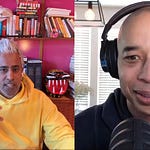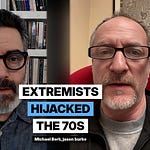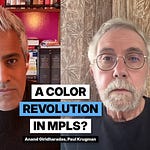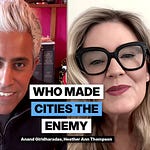This morning, on “Morning Joe,” I got to ask former Governor-turned-mayoral candidate Andrew Cuomo some questions. Come for the pronunciation lesson; stay for the part where he compared #MeToo claims to insulting my leather jacket.
In moments like this one, I try to be as fearless as I can. And it’s your support for independent media that bolsters fearlessness. When you are answerable only to your readers and yourself, you can tell it like it is. So if you haven’t yet, do subscribe:
And tell me what you made of the exchange.
A transcript
CUOMO:
The Democratic party has to produce. The far left runs “Mam-dami” for mayor, 33 years old, never had a job, never managed anything. An assemblyman, passed three bills. Worst attendance record in the New York State Assembly. As a mayor, as an executive, as somebody who’s supposed to get things done — no. That’s going to compound the problem.
ME:
First of all, governor, it’s “Mamdani.” This is a very big, diverse city you want to lead. We should get the names right.
Self-awareness is such a powerful thing in politics. You can’t beat what you don’t understand. You seem very dismissive of his support, but his support has been overwhelming, and he won the primary, his support is overwhelming in the polls now. You come from a storied political family — you talked about your dad, you’ve been governor, you’ve had these big jobs. You have astonishingly good political networks, connections, bases of support. What is your most self-aware understanding of what you failed to see in advance that would allow a 34-year-old upstart to be beating you so badly? What did you not see and understand about people who are living in this city and what they’re feeling and going through?
CUOMO:
I did not see the energy of the 20-to-30-year-olds. I didn’t see — I knew the affordability issue. I didn’t think they would accept the “Freeze the rent” slogan as an actual answer, and that we wouldn’t get deeper and beyond that. Because the rents are the problem. It’s just there is no answer that has been posed. It’s not about freezing the rent. I’m the former HUD secretary. I know how to build affordable housing. I know the issue. I know the answer, but we just never had a real discussion about it, and that I didn’t foresee.
And I didn’t see the anti-Israel anger; I didn’t see that. I didn’t see how that was going to motivate people in a mayor’s race. I saw the anti-Israel anger. It was on the street, but you are going to vote for mayor based on your opposition to Israel? Last time I checked, the mayor doesn’t have a lot to do with foreign policy. I don’t see the mayor walking in and out of the United Nations, but you use that as a vehicle to express your anti-Israel anger, which was in the middle of the most heated moment of the conflict. I didn’t see that connection. You would vote for mayor because you’re —
ME:
I will say, I think for a lot of voters, it’s more of a proxy for your level of solidarity with people who are on the wrong end of power, and for a lot of people there’s a generalization of different struggles there.
I wanted to ask you, it’s eight years since the kind of peak of the #MeToo movement. You were one of the men caught up in that conversation. Some of those men from that era are out of public life forever. Some never left. You are back running for this race. I’m curious, did you go on a journey in the last eight years of any kind of personal transformation? Was there any kind of reflection you got, any help you got? I think people can change. I wonder if you pursued any kinds of changes in yourself that would allow you to come back to City Hall and tell voters you’d be different in any meaningful way when it comes to dealing with women than you were when you were last in office.
CUOMO:
Well, it was a journey. It was an expedition. It was the hardest thing I went through in my life, and I’ve gone through a lot. When the allegations were made, you’re right, it was the heat of the #MeToo movement, and there was a lot of political energy. I said at that time they were false and that I did nothing wrong, but there was such intensity about it, and especially among Democrats, that there was zero tolerance and nobody wanted to have a real conversation. The report — I then spent five years living through it. The report went to five district attorneys, Democratic and Republican, highly political, had to go through it with each of one of them four years. Then in civil litigation, depositions, witnesses, etc. At the end of the day, nothing came of anything. I was dropped from the cases, so it was what I said it was. There was no there there, and that’s why I’m in a position where I can come back.
But in the meantime, did I learn? Certainly. Look, there is a new sensitivity and evolving sensitivity culturally about behavior and what behavior is right or wrong or what I might find offensive, and it doesn’t matter whether you agree or not. If I find what you said offensive, then it was offensive, and it’s my standard that matters and I should have been hyper-cautious because you have to be hyper-cautious, right? Because anything you say, I might find offensive. So you have to be hyper-cautious. I have to be more cautious. I learned that lesson. I paid a very high price for that lesson, and it’s not a mistake I’m going to make again. I won’t even meet with a person alone anymore. I want a witness now to every conversation, every interaction, but it was a painful process. Not only for me, we were chatting before. I have three daughters, 30, 28, and 28.
ME:
Have they helped you kind of figure out — they’re obviously in the world also — have they helped you figure out ways to evolve?
CUOMO:
We had many conversations about it, and they are in that age bracket, frankly, where they have an evolving set of sensitivities and they hear things differently than I say them, actually. Even words have different meanings. So, yes, a hypersensitivity. I said, Look, if I offended anyone on any level about anything, I apologize. If I said something about your jacket and you got offended, I apologize, and I do that as common fare.
Watch the full interview with the “Morning Joe” panel here below:











